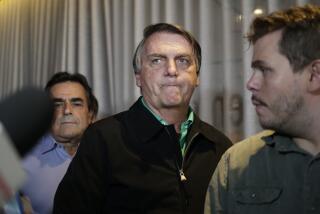POLITICS : Brazil’s Leading Candidate Loses Momentum : Presidential hopeful Luiz Inacio Lula da Silva fights to avoid a runoff. His image is threatened by a scandal surrounding his choice of running mate.
- Share via
RIO DE JANEIRO — Just when it appeared that Brazilian presidential candidate Luiz Inacio Lula da Silva and his signature campaign “Caravans” were steamrollering through the countryside toward the nation’s capital with hardly a bump in sight, the wheels have started coming off the train.
Little more than a week ago, Lula, a union leader, grade-school dropout and former metalworker, was riding a huge lead in the polls and appeared close to capturing the Oct. 3 election with more than half the vote, thus avoiding a dangerous November runoff with his closest rival, Fernando Henrique Cardoso.
But a recent series of campaign blunders, a resurgence by Cardoso and the possible resignation of Lula’s vice presidential choice amid a sea of controversy have stopped the candidate in his tracks. His party finds itself mired in damage control just as the race enters its most crucial phase.
Most damaging is the controversy surrounding Lula’s vice presidential choice, Jose Paulo Bisol, a senator who offered to resign Wednesday following press reports of shady bank loans and attempted influence-peddling in the Senate.
Brazilian voters are keenly interested in their vice presidential candidates, since for seven of the past 10 years, vice presidents have governed in place of those who led their tickets. In 1984, Vice President Jose Sarney became president, serving five years, when Tancredo Neves died before assuming office. The current president, Itamar Franco, assumed the top post during 1992 impeachment proceedings against Fernando Collor de Mello, who resigned.
A former judge and state legislator from the southern state of Rio Grande do Sul, Bisol had touted himself as a “Mr. Clean.” He was involved in Collor’s impeachment and used his chairmanship of a Senate subcommittee to crusade against fellow federal legislators implicated in a massive, national budget scandal.
Recent news reports have destroyed that facade, smearing Lula’s pristine image in the process.
The reports charge that as a state judge in 1981, Bisol and his fellow magistrates entered into an agreement with a local bank to deposit millions of escrow money with the bank, exempting the bank from having to make the normal adjustments to match the nation’s rampant inflation rate, then 50% annually. In return, the bank gave the judges a series of loans with interest rates so low that they were essentially gifts.
The news stories also allege that later, as a state legislator and then senator, Bisol received a series of questionable low-interest loans, many of them unsecured, for equipment and construction on his farm in the state of Minas Gerais.
Finally, and most damning, Bisol tried this year to sneak an amendment into the federal budget for extensive construction of roads and a bridge next to his farm.
Lula’s opponents, nearly all of them from parties already tainted by one or another of the country’s many scandals, have jumped at the opening.
“The Bisol episode shows that the Workers’ Party is moralist only in words, not in deeds,” said Orestes Quercia, a presidential candidate who is currently facing criminal charges for his dealings when governor of Sao Paulo.
The Bisol affair comes right on the heels of a disastrous campaign swing through Minas Gerais where Lula was picketed by members of his own party and where radio announcers, upset that the candidate had canceled interviews, urged residents to stay home.
Meanwhile, Cardoso, who when he was finance minister devised the country’s new economic plan, has received a favorable bounce in the polls as Lula’s numbers have begun to dip slightly. The Bisol debacle, political analysts say, makes a runoff a near-certainty.
“It’s hurt us, there’s no question about it,” said a ranking Lula staffer, part of the team that may soon be selecting a new vice presidential candidate. “But it came at a good time. Right now, everybody is interested in the World Cup. Hopefully we can recoup when the campaign really starts in August.”
That is when the candidates will begin to receive free, federally mandated campaign time on national television.
More to Read
Sign up for Essential California
The most important California stories and recommendations in your inbox every morning.
You may occasionally receive promotional content from the Los Angeles Times.













